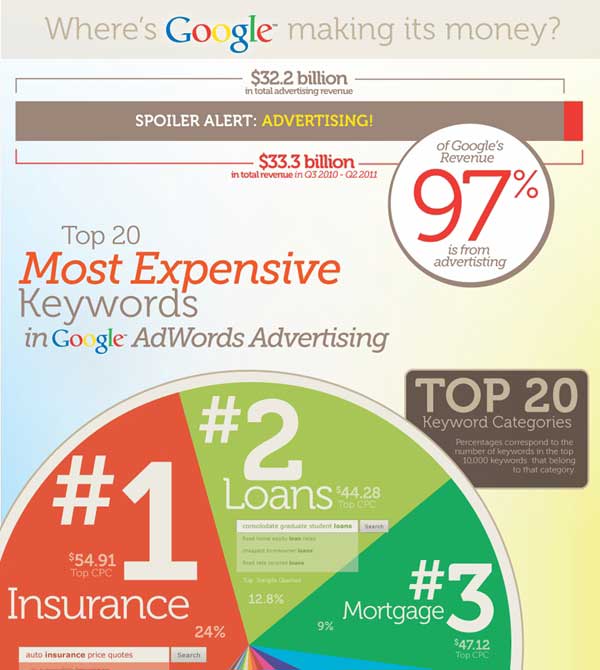The insurance category fetches the highest cost-per-click (CPC) rates in Google AdWords pay-per-click (PPC) advertising: nearly $50 per click, according to new keyword research data from search marketing software provider WordStream Inc.
Its findings revealed the top 20 high-volume keyword categories and their CPC rates. Those keywords are how Google makes the majority of its profits, Wordstream said.
In the last four quarters alone, Google made $32.2 billion in total advertising revenue--97% of that from advertising, according to the findings.
The top five high-volume keyword categories that demand the highest costs per click are as follows:
- Insurance. Top CPC: $55 (example keywords/keyphrases are "auto insurance price quotes" and "buy car insurance online)
- Loans. Top CPC: $44 (examples: "consolidate graduate student loans" and "cheapest homeowner loans").
- Mortgage. Top CPC: $47 (examples: "refinanced second mortgages" and "remortgage with bad credit")
- Attorney. Top CPC: $47 (examples: "personal injury attorney" and "dui defense attorney")
- Credit. Top CPC: $36 (examples: "home equity line of credit" and "bad credit home buyer")
What the Data Means
Some conclusions that can be drawn from that keyword data, according to Wordstream:
- In Google AdWords, the minimum bid per keyword is $0.05, but in highly competitive categories Google can make up to $50 per click. Despite its diversified product portfolio, PPC accounts for the vast majority of Google's billions in annual revenue.
- The keyword categories with the highest volumes and costs are used by businesses with very high lifetime customer value. Accordingly, those industries can afford to pay lot to acquire a new customer. Lawsuits, mortgage applications, and server hosting are among those business types. Some high-volume keyword categories have lower CPCs because advertisers have slimmer margins to expend on PPC advertising.
- Not surprisingly, Google has rolled out product comparison ads in the loans and mortgage keyword verticals. Google will likely release more such ads, and similar innovations, in the other top keyword categories, according to Wordstream.
The results of the study are illustrated in an infographic of the most expensive keyword categories (partial image below):

Tips for Keyword Bidding in Competitive Niches
To compete in a high-volume, high-CPC keyword category, the same PPC best-practices apply as for any other category, except that the stakes are up to a thousand times higher, according to Wordstream founder and CTO Larry Kim. Among the tips he offers in a blog post are these:
- Target specific 3-5-word keywords, use a keyword tool to generate keyword ideas, and use keyword match types so that you pay only for keywords highly specific to your business.
- Use a negative keyword tool to decide which keywords to eliminate—i.e.,those that aren't relevant to your business.
- Optimize your landing pages. Doing so can lift you conversion rate for AdWords from 2% to 20% or higher. The key is to keep testing different types of offers.
About the study: WordStream compiled data from its trillion-keyword database and the Google Keyword Tool to determine the top 10,000 most expensive English-language keywords over a 90-day period. That list was then organized into categories. The largest categories were derived by taking into account the number of keywords within each category and the estimated monthly search volume and average CPC for each keyword.




